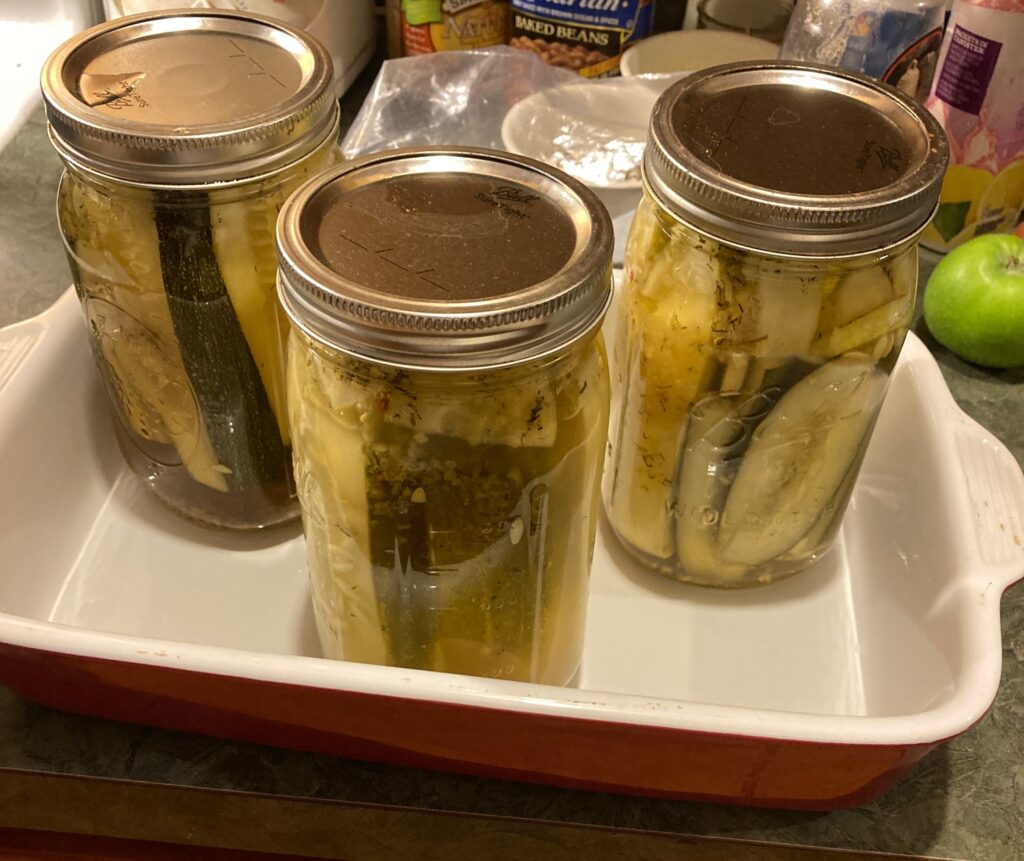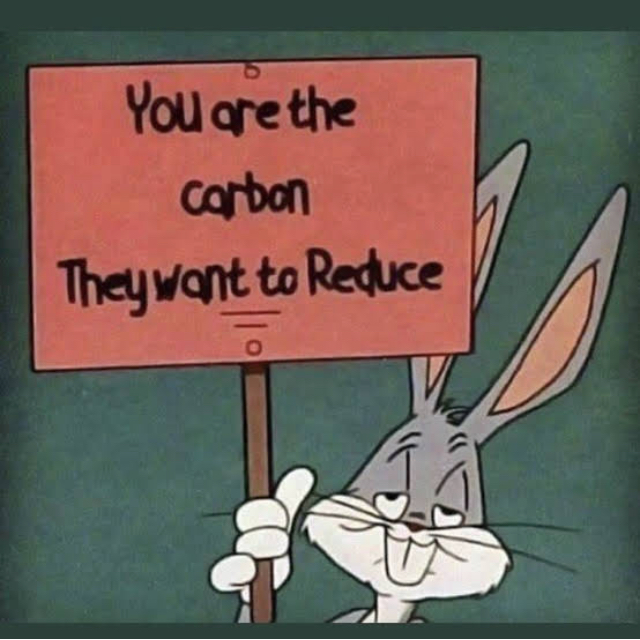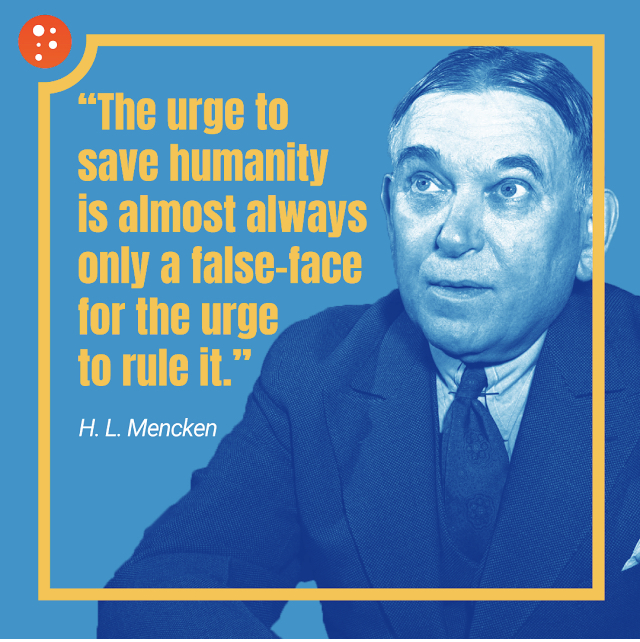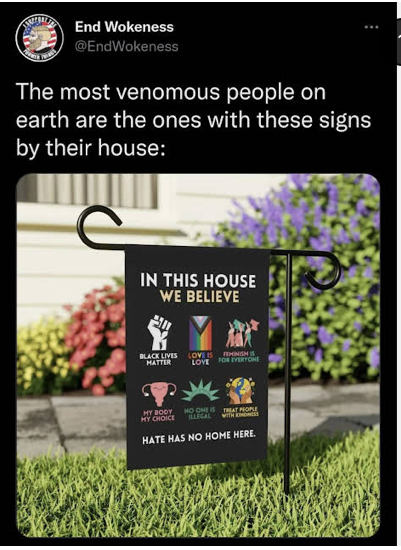Posts Tagged → environmental
Why we share wild food with each other
People around the planet enjoy sharing wild food with one another, and we always have since God above evolved our species, however it is He evolved it. It is an innately human trait to both enjoy giving and receiving wild food.
Wild food is a broad category, but it excludes anything we buy, especially in a big store. Foods from stores are almost always, or are always, plants and animals raised in intensive industrial environments, replete with chemicals everywhere and in everything. Wild food usually includes fruits, herbs, and vegetables grown in our own gardens; fruits we have picked in the wild, like berries and apples; and any wild game meat or fish we have harvested. Chemicals are either non-existent or are naturally occurring in minute amounts from the native soil.
All around the planet people put a high premium on wild harvested meat. In Africa and Australia, “bush meat” is highly valued as fresh, nutritious, free of human-injected chemicals and hormones. Everywhere bush meat is eaten, it is traded in lieu of money. And when a European bites down on a size 8 piece of shot in her forkful of grouse recently from the Scottish Highlands, where it was shot on a drive, hung for three days in a cooler, and then shipped off to Spain, Germany, England, or France, she knows she is eating something special, and it tastes even better. The same is said for the meat of hunted red deer, and occasionally wild boar, both of which are highly prized foods served in restaurants and home kitchens across Europe.
Wild food is better for us, we all know that, both in terms of what is in it and also what is not in it, because (except for poached bush meat from at-risk wild animal populations in Africa) it is environmentally sustainable. It also tastes better, because it has grown up under natural circumstances. Giving and receiving it as a gift is a symbol of real friendship and caring. Wild food is something most Americans can participate in, especially as growers and givers, and so I hope that someone reading this is inspired to take a corner of their luxury status symbol yard and turn it into an unruly food garden. The pleasure of sharing the harvest with friends and neighbors is quite enjoyable.
Humans began as hunters and gatherers and we remain such, even with our thin veneer of civilization inartfully separating us from the wild world around us. Much of our innate gender differences are centered on what hunting and gathering was done by our ancestors over the past few hundred thousand years. Gathering food by hand is a natural and innately human thing to do, and most people find gardening calming and enjoyable. I guess being a real human and not a false, contrived human can be pleasurable.
Last month I picked over six pounds of blueberries and another five pounds of blackberries and red and black raspberries, about a hundred pounds of peaches, and about fifty pounds of apples. I won’t share these hard-won prizes with you by the fistful, because then the berries would all disappear within a few minutes. Rather, I will share them by mixing them into muffins, pancakes, cobblers, pies, and preserves spread onto toast, ice cream, and cakes. This way these gems last all year long, and everyone gets to share in them.
Aside from being cleaner and tastier than industrial foodstuffs wrapped in plastic and styrofoam, wild food has the benefits of bringing us closer to nature, closer to reality, closer to self-reliance and self-sustainability, and closer to people we might not normally encounter. Nature can be the sharp berry bushes we must reach through to pluck our juicy berries, and it can also be the mother bear and her cubs waiting for you and me to clear out of the scratchy berry patch so they, too, can feed on Nature’s bounty.
Nature here can also include a variety of destructive garden pests like squirrels, rabbits, groundhogs, and chipmunks, and learning to cope honestly with these artificially overabundant animals teaches us important lessons about reality versus luxurious and silly childish feelings and notions of animal welfare that are terribly destructive.
For example, artificially high populations of pest species, like squirrels and ground hogs, spread high amounts of disease and physical destruction. And when vegans strut and brag about their reliance on industrial monocultures like soy beans, they ignore the tremendous environmental and habitat destruction wrought in their vegan names. There are significant environmental costs to veganism and vegetarianism that could be offset if those adherents participated in wild food, like growing their own and trading/ bartering for what they cannot grow themselves. Few things are more annoying than listening to someone from a wealthy lifestyle bragging up their veganism/ vegetarianism while simultaneously tearing open plastic wraps and environmentally damaging containers containing industrial foods. Food isn’t just about what you put in your mouth, it is very much about where it comes from, where it was grown and where it lived before your credit card brought it home.
Hunting in America and Canada produces millions of pounds of fresh, clean, natural, wholesome wild meat for more than just the people who pull the trigger. Hunters Sharing the Harvest is a well known program that enjoys widespread support from both givers and receivers. Schools, neighborhood soup kitchens and homeless shelters, and just simple low-income people, all benefit from receiving this wild meat. And farmers and forest owners benefit from having artificially overabundant deer and hog populations thinned out so their crops can grow in peace.
For those silly people who oppose hunting, jiminy crickets, people, wake the heck up. You are not living in a fairy tale book, and you are having your own huge impacts on the planet around you. An animal’s life is not just measured by how it died, but also how it lived. Almost all industrial meat comes from factory farms, enough said. However, wild meat comes from animals living their lives to their fullest before quickly falling over dead from a bullet or an arrow. Any modern educated human who believes that wild animals die naturally under antiseptic and peaceful conditions is a fool, enough said. Recreational and population management hunting (not poaching or market hunting) is a perfect way to provide environmental protection to wildlife habitat, conserve vulnerable wildlife populations, and harvest natural, sustainable wild food.
By mid-December of this year, I will have probably shared over a hundred pounds of wild meat, mostly venison, occasionally waterfowl, turkey, and small game. The people who receive my gifts of deer meat (that I have shot) are always grateful, and they often report back to me on what they made with the gift, who they shared it with, and how delicious it tasted. This exchange is true friendship, and in a politically fractured world, we all can use a little more friendliness, a few more friends. Wild food is my way of contributing.
In an hour I am dropping off a bag of peaches from my own trees, and picking up a bag of pears from my friend Ryan’s trees.
What wild food are you going to grow or harvest, eat, and share? If you have a big lawn, put away that lawn mower and start growing your own food. You will like it, I promise.
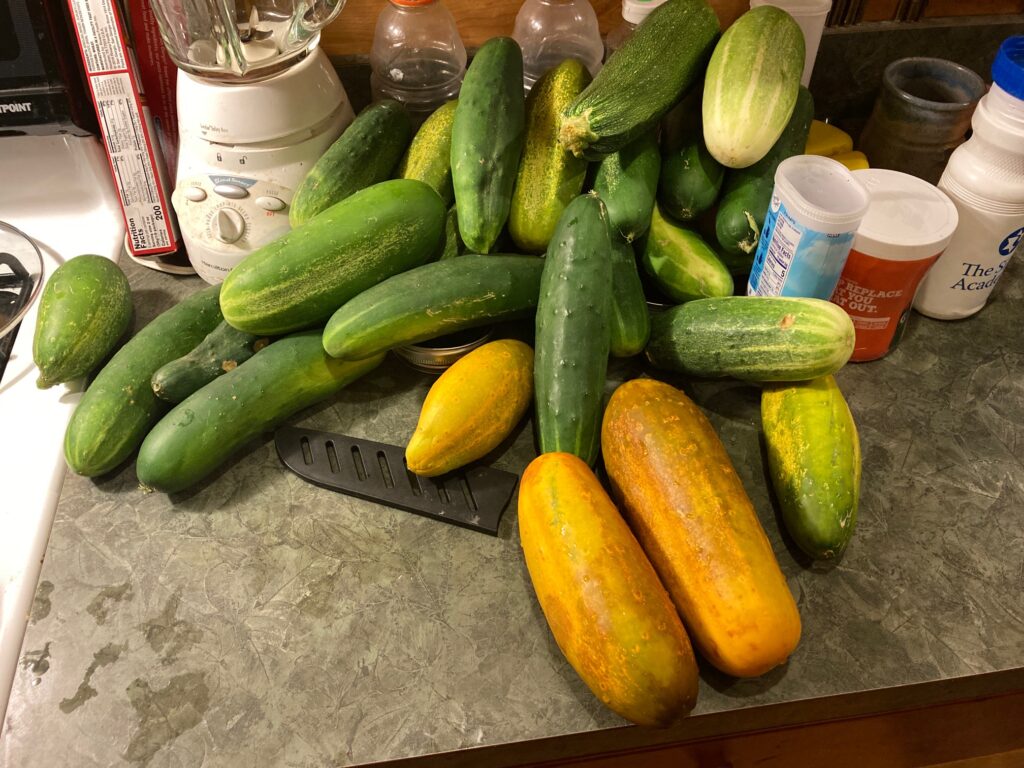
cucumbers from our garden don’t cost a dollar apiece like in the stores, and they are fresher and have no chemicals. Our home made pickles are far tastier than store bought, and have no chemicals. We use the overripe ones to make bread and butter pickles.
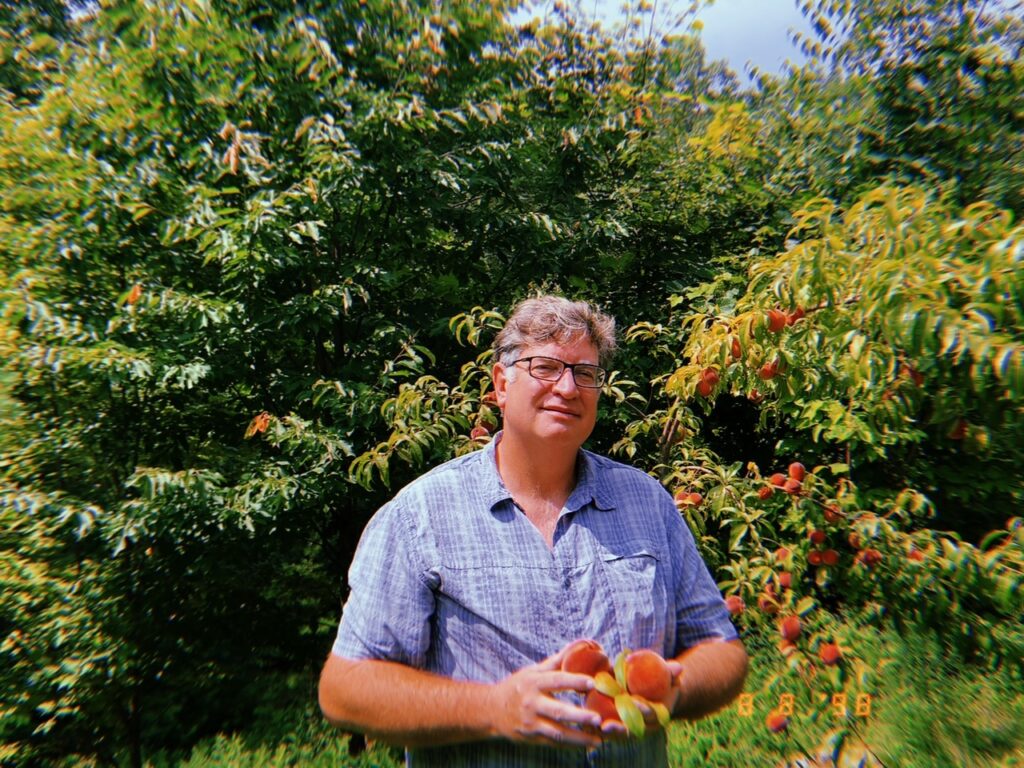
We have a bunch of peach trees. If the bears and the squirrels don’t raid them, we get to enjoy them, and cook with them, all year long
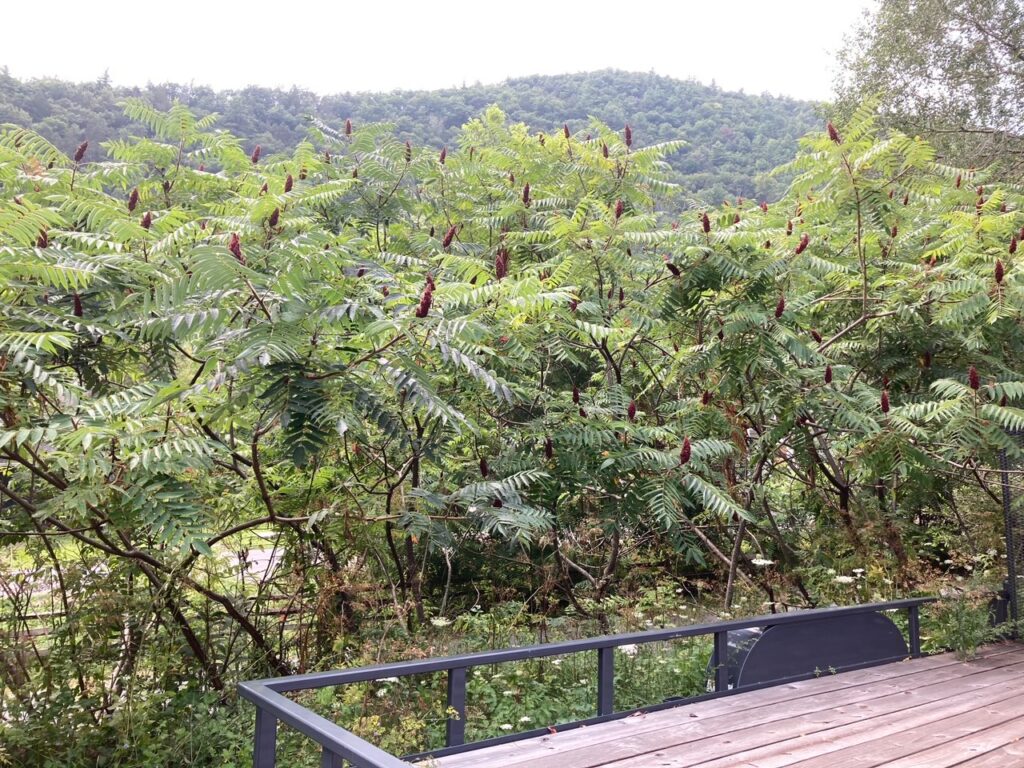
Sumac grows wild everywhere. Steeping a few heads in a bowl of warm water provides the most delicious drink possible. Chill it, serve it with sugar over ice, sumac tea is free, easy to forage, and chemical free
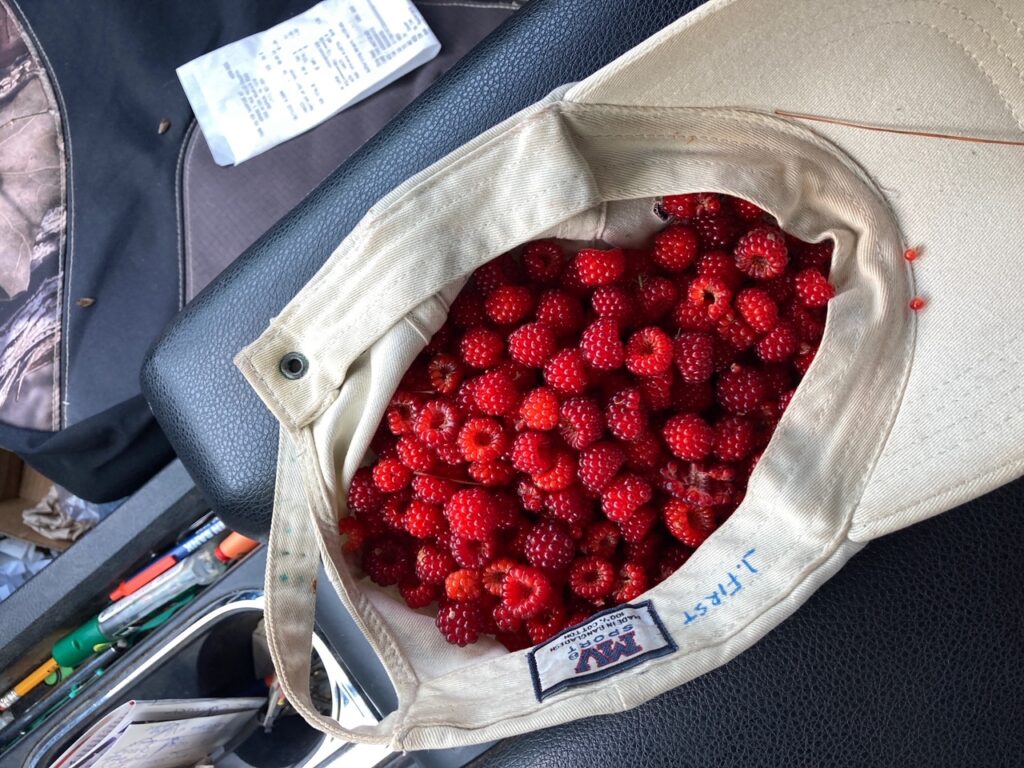
A hatful of red raspberries I foraged in July in the shrubbery of a public parking lot. IN a store you would pay twenty dollars for these wild ones, and they would be half as good. Go forage and pick your own food
The Real Crisis at Davos is WEF’s Tidal Wave of Bullsh*t
Some people are addicted to adrenaline, to crisis, and to being always on the move, hopping from one phone call to the next to nonstop meetings, followed by the inevitable “Gosh I am so crazed and busy, I am soooo stressed.” As if they did not do it to themselves, victims of their own bipolar, egomaniacal, or cutthroat competitiveness.
These people may be Michelin Man full of peanuts, but at least they are trying to be productive, in their own way. They may bother everyone around them, try to hijack most projects and processes around them, and be the kind of person you try hard to avoid in the parking garage at the end of the day, but they are probably a net-positive force. Maybe by a slim margin, but they are still on the positive side of the equation.
Then there are people for whom shouting “Crisis!” from the rooftops is a purposeful scam. So they can be in control, of the rest of us. These people use the latest manufactured fake so-called “crisis” to make end-runs around collective decision making processes and procedures that would normally bog down over or outright reject such a claim of “crisis” due to a lack of evidence.
In the past sixty years there have been a bunch of fake crises, most of them some shade of environmental or another. Paul Ehrlich (see below) was predicting the end of the world (really, like the entire world would come to a cataclysmic halt) back in the 1960s and 1970s. And when the world did not end in the 1970s, he predicted its demise in the 1980s, 1990s and even in the 2020s! He is still at it, saying pretty much the same thing.
Obviously, the world has not ended and Paul Ehrlich has been wrong the entire time. His crisis is fake.
Paul Ehrlich may be wrong, but nevertheless he is persistent. To his credit, he is not persistently crazy, but rather consistently smart. Like another “the end of the world is nigh!” false messiah, Al Gore, Ehrlich has learned that a foolish soup of the intellectually gullible and the politically mal-aligned reward him whenever he steps up to a podium to declare that capitalism, Americans, gas stoves, cars, whatever the false issue du jour is, are all going to result in the end of the world.
Today the Neo Nazi League World Economic Forum meeting in Davos, Switzerland has assembled a who’s-who of villains, career politicians, fakirs, weirdos, sycophants, coelacanths, investors, psychics, and actual real Nazis who want to own your body and your soul. The literal Nazi skinhead of the WTF WEF, Klaus Schwab, has declared 2023 to be a year of “polycrisis.”
According to WTF head Klaus Barbie Schwab, there are now so many crises attacking us all at once that the entire Western democratic system of self-rule and self-decision making and self-problem solving must be ended, so that he and his little cadre of Neo Nazi technocrats can fix everything. Yes, Herr Fuhrer Schwab is sounding the alarm on a whole array of (utterly fake) crises that demand America come to a screeching halt. No more gas cars, no more gas stoves, no more meat…”You will own nothing and you will be happy” he says, meaning it more now than ever before.
Herr Schwab’s fake climate and gas stove and environmental alarmism is obviously fake, but his cadre’s lust for power and control is not fake. It is real. Within the WEF WTF’s tsunami of bullshit crisis is a very serious threat to humanity, and this is a real threat and potential crisis that we have seen over and over before: Mass murderers Mao, Stalin, Lenin, Hitler, the Democrat Party in 1860-1865 and again now, Julius Caesar, the Pharoah, Nebuchadnezzar, and a thousand other violent tyrants who have claimed the right to govern us absolutely because of some “crisis” or other.
The WTF WEF people may be a bunch of evil thugs who we must resist at all costs, but they do get credit for unabashedly living a pimped out high end lifestyle in broad daylight. Like high and mighty feudal princes of old, they don’t listen to a word of their own demands that they place on the rest of us. They have hundreds of jet airplanes taking individual members to Davos, some of the flights being only twelve miles, with enormous outsized plumes of carbon emissions to each member’s sole ownership and credit. And they have the highest price prostitutes possible (I am not talking about the CNN, NPR, BBC staff, but actual hookers), the best alcohol and the most exotic real meat and shellfish food possible.
There may be a tsunami crisis of BS at the WTF WEF World Economic Forum, but wow, those people nonetheless know how to live high on the hog! Without an apology to anyone…
They must think We, The People are a bunch of idiots.
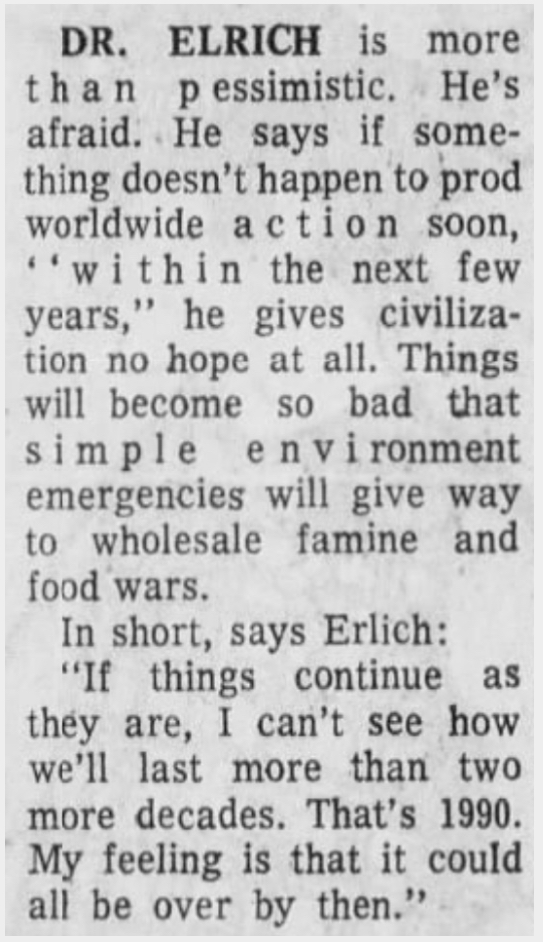
August 13, 1970 edition of the Orlando Sentinel citing grand environmental fakir Paul Ehrlich. In the intervening fifty three years, none of Ehrlich’s dire predictions have happened. But Herr Klaus Schwab, Al Gore and yes, even Herr Ehrlich are still peddling the same b*llshit
Forestry 101
“Clearcutting” forests has become a no-no idea, a bad word with most people. Whether it was environmental advocates or ripped off landowners who said it was wrong, it’s not clear.
Nothing could be farther from the truth. “Select cut” forestry is usually the worst thing you can do, because it takes the best and leaves the rest. Worst-first is the by-line of sound forestry. Clearcutting removes a great deal of the forest canopy so that other trees and plants may grow.
It’s true that I have seen failed clearcutting, but out west, where the thin soils, steep slopes, and dry conditions leave forests at risk from too much canopy removal. Those conditions rarely apply to the northeast or the south.
Recently I contracted Lyme Disease, for the third or fourth time. It’s my guess that ticks are growing in number and area because forest fires have been artificially suppressed for so long. Short of controlled burns, clearcutting is as close as we can get to mimicking the cleansing effect of a forest fire.
If you have forest land and you want to manage the timber, don’t be afraid to clearcut it, if the trees there support that management tool.
Keystone Pipeline Needs Conservation
President Obama has nixed the Keystone Pipeline.
Environmental advocates applaud as the project dies, even as America continues to depend on foreign oil from people who hate us. It doesn’t make much sense.
What’s needed is a good dose of old fashioned conservation. You know, mitigate the pipeline’s impacts by protecting the land around it, thereby turning it into a permanent wildlife corridor and greenway.
Maybe even a transcontinental trail can run along it.
If I had anything to say about it, these kinds of solutions would be on the table, and the project would be moving forward.
